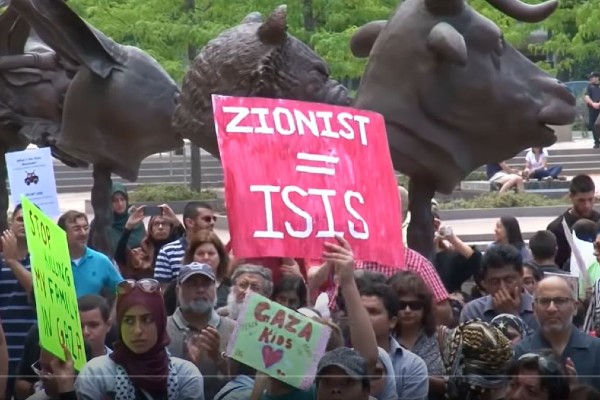The report said extreme anti-Israel activism had an outsized effect on Jewish students during the 2020-2021 academic year.
By Dion J. Pierre, The Algemeiner
American college campuses experienced anti-Israel activity and inflammatory rhetoric at the “highest rate in recent memory” during and after Israel’s May conflict with Hamas, according to a new report by Anti-Defamation League (ADL).
Released Tuesday as part of the ADL Center on Extremism’s efforts to track antisemitism in higher education, the report said extreme anti-Israel activism had an outsized effect on Jewish students during the 2020-2021 academic year — and often “crossed the line” from legitimate criticism of Israeli policies into “blatant expressions of antisemitism from certain groups and activists.”
One of the more common strategies of anti-Israel activists in the 2020-2021 academic years was to cast any connection or support for Israel as racist, argued the report, The Anti-Israel Movement on U.S. Campuses: 2020-2021.
“In its most extreme and troubling manifestations, calls are made for individual Zionist and pro-Israel students to be barred from campus spaces, including, at times, from student government,” the ADL said. “Such calls almost always target Jewish students despite many non-Jews who also identify as Zionist or pro-Israel.”
In November 2020, for example, the Students for Justice in Palestine (SJP) chapter of University of Illinois-Urbana Champagne called for excluding Zionist students from social justice activities, based on the claim that “white supremacy is inherent to pro-Israel advocacy.”
In a February 2021 incident, a Tufts University student and judiciary member was “grilled” by the student government with questions about his “Jewish and Zionist identities” after Tufts SJP circulated a petition demanding that he recuse himself from debates of an anti-Israel student referendum.
The ADL’s campus report also examined campus activists’ veneration of Leila Khaled — a woman who helped hijack two civilian aircrafts in 1969 and 1970 as a member of the Popular Front for the Liberation of Palestine (PFLP) terror group — as a “feminist icon” of the pro-Palestinian movement.
Evocations of antisemitic tropes by campus groups were also documented, such as University of Illinois-Chicago SJP’s December 2020 posting of a meme encouraging their members to call Zionists “colonizers” and tell them to “go back to Brooklyn.” Elsewhere, events were held at which Israel was equated with the Nazi regime and depicted as committing incomparable levels of violence against Palestinians.
“A segment of campus anti-Israel groups and activists engaged in rhetoric that incorporated antisemitic tropes, including those related to alleged Jewish power and control over the media or political affairs,” the ADL said, describing several incidents. “They repeatedly appear unaware, ambivalent or defiant when their own rhetoric about Israel and Zionism becomes offensive or plays into antisemitic themes. More often, they deny that it is even possible for anti-Israel or anti-Zionist rhetoric to be antisemitic.”
Efforts to endorse Boycott, Divestment, and Sanctions (BDS) continued to be a “cornerstone of anti-Israel activity,” the ADL noted. The group documented 11 motions successfully passed by student governments to endorse BDS during the 2020-2021 academic year, out of 17 attempts. These resolutions, often promoting disinformation about Israel, demanded that universities “sever ties, usually through endowments or other investments, with companies that provide services or equipment to the Israeli military.”
No college president agreed to a boycott of Israel, and in several cases, they urged students to consider how calls for BDS affected their Jewish classmates.
Commenting on the report’s release on Monday, ADL CEO Jonathan A. Greenblatt said, “expressions of antisemitism under the guise of Israel criticism are unacceptable.”
“Freedom of speech does not mean freedom to harass and intimidate,” he continued. “Administrators, students, and faculty, need to ensure a safe and inclusive environment for all students, regardless of religion, nationalist, or ethnicity.”





